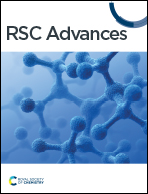Conversion of cellulose into aromatic compounds using supported metal catalysts in high-temperature water†
Abstract
Production of aromatic compounds from lignocellulosic biomass has recently been one goal of efforts to establish a sustainable society. We studied cellulose conversion into aromatic compounds over charcoal-supported metal catalysts (Pt/C, Pd/C, Rh/C, and Ru/C) in water at temperatures of 473–673 K. We found that charcoal-supported metal catalysts enhanced conversion of cellulose to aromatic compounds such as benzene, toluene, phenol, and cresol. The total yields of aromatic compounds produced from cellulose decreased in the order: Pt/C > Pd/C > Rh/C > no catalyst > Ru/C. This conversion could proceed even at 523 K. The total yield of aromatic compounds reached 5.8% with Pt/C at 673 K. The charcoal-supported metal catalysts also enhanced conversion of hemicellulose to aromatic compounds.



 Please wait while we load your content...
Please wait while we load your content...